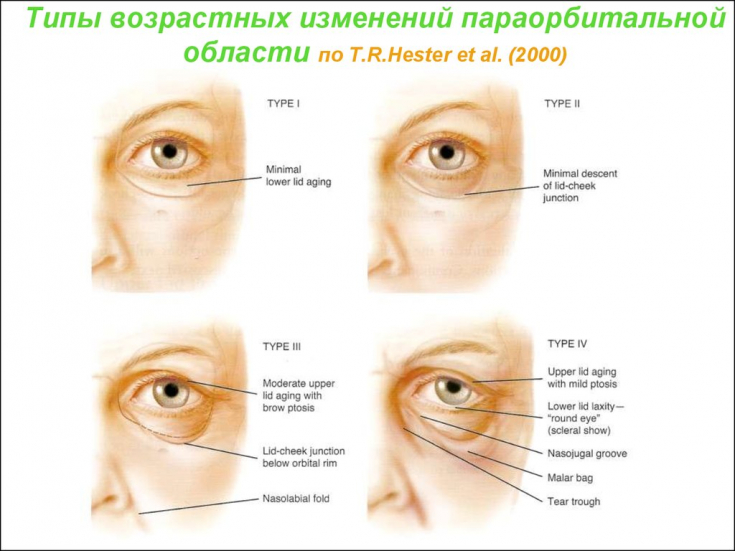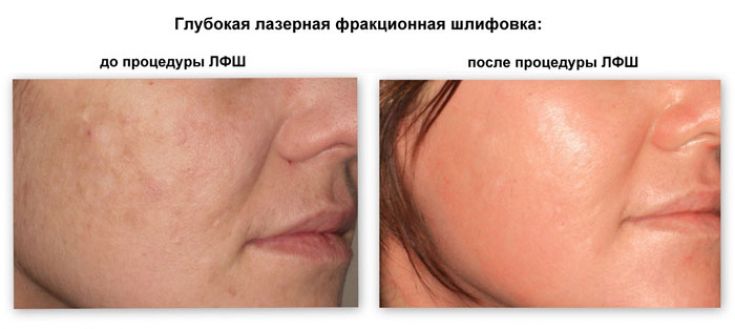− this procedure is aimed at skin rejuvenation, correction of scars, post-acne, treatment of post-traumatic scars and scars, using a fractional CO2 laser. Recent studies in the field of aesthetic medicine have studied the effect of laser-induced remodulation on the effectiveness of the correction of age-related changes in the skin of the periorbital region, in particular the lower eyelid.
Be the first to know in the article on estet-portal.com
about the possibilities of modern correction of age-related changes in the periorbital zone using a laser.Anatomical features of the upper and lower eyelids
Periorbital wrinkles and dermatochalasis (dermatochalasis — a condition characterized by hypertrophy and decreased elasticity of the skin and muscles of the upper eyelid resulting from natural aging and constant sun exposure.) are common and striking signs of facial skin aging.
Follow us onInstagram! Over time, progressive changes occur in these structures, which leads to an imbalance between them, a change in volume and anatomical position. All these processes lead to obvious external cosmetic problems, which causes psychological discomfort to the patient.
Lower eyelid: physiology of wrinkle formation
In 2007, Lambros presented the stability of palpebro-malar structures based on photographic research. This explains the local aging process as a process of soft tissue change and protrusion of fat deposits of the lower eyelid, which aggravates over time and leads to the formation of the bucco-zygomatic furrow.
The genesis of their formation is associated with sagging or protrusion and disposition of axillary and intraorbital fatty tissue.
In 1961, Loeb coined the term "nasojugal sulcus"; − nasopharyngeal sulcus, in order to determine the change between the lower eyelid and the medial part of the zygomatic region. Nasal groove or mid-cheek fold − furrow, which is formed as a result of age-related changes in the tissues of the cheekbones and the lowering of the tissues of the lower eyelid under the influence of gravitational forces.
Protocol for complex correction of the periorbital area The lower eyelid is part of the middle third of the face, where the upper border is limited by the outer corner of the eye, and the lower border runs along the border of the lip. Different degrees of aging for the middle third of the face were systematized by Hester in 2005. According to his classification, type I − this is aging at the level of the lower eyelid with the formation of dermatochalasis.

Over time, the collagen and elastin of the periorbital region suffers from degeneration caused by age and ultraviolet light. But there is one factor that affects the formation of collagen – it is controlled damage to the epidermis.
The possibilities of laser for the correction of age-related changes
For almost a quarter of a century, the ablative CO2 laser has been the "gold standard" for for skin polishing. With the help of a laser using a wavelength of 10,600 nm, a targeted effect on water molecules occurs. The water in the tissue absorbs this energy, which leads to evaporation, induction of collagen stretching by heat, skin contraction and subsequent neocollagenesis. The concept of photothermolysis has revolutionized laser surgery.
The use of CO2 laser in the treatment of age-related changes in the skin of the periorbital region eliminates in most cases the need for plastic blepharoplasty with skin resection and subsequent possible complication in the form of scarring of the lower eyelid.
Key trends in modern correction of the periorbital area With the use of a laser, the dermis is remodeled, resulting in the formation of new, compact collagen and normally organized elastin. Histological studies indicate an increase in the horizontal folding and orientation of new collagen and newly formed elastin in the papillary and reticular dermis for at least 18 months after CO2 laser use.
Clinical study of laser application
A clinical study on the effectiveness of laser for the correction of age-related changes in the skin of the lower eyelid was conducted on the basis of results over the past 18 years with more than 350 patients. The main feature of this retrospective study is that only CO2 laser technology was used, focused on age-related changes in the skin of the lower eyelid and the presence of dermatochalasis.
Enemies of youth: why facial contouring should not be postponed for a long time

Read about the results of clinical trials in the following article on estet-portal.com and stay up to date with all the innovative achievements of aesthetic medicine.
Features of blepharoplasty in the correction of the eastern section of the eyes







Add a comment